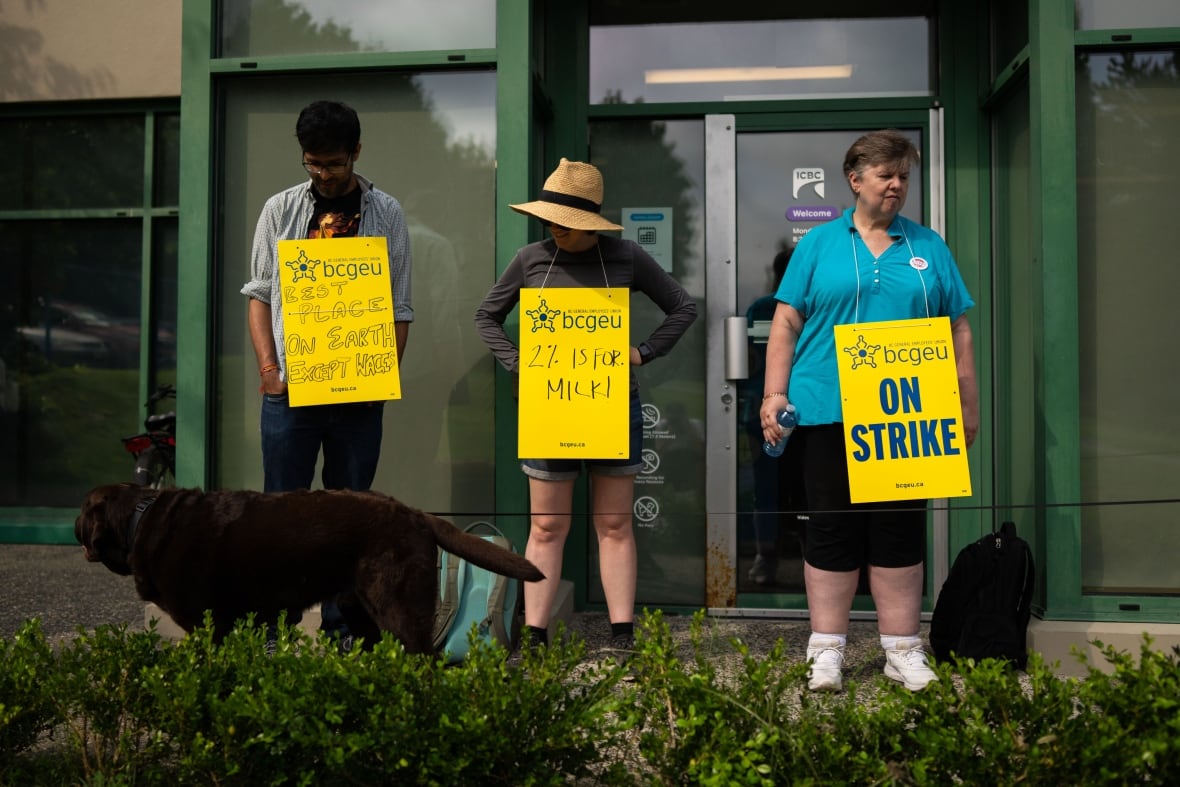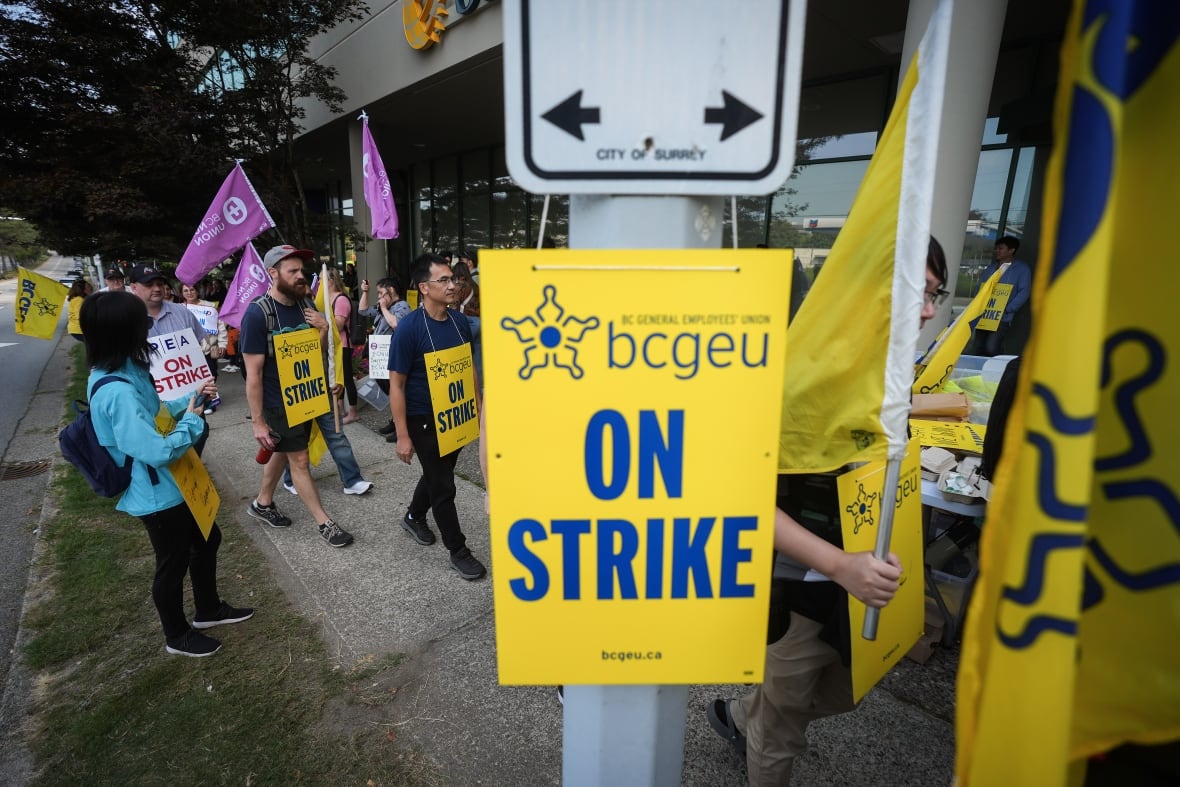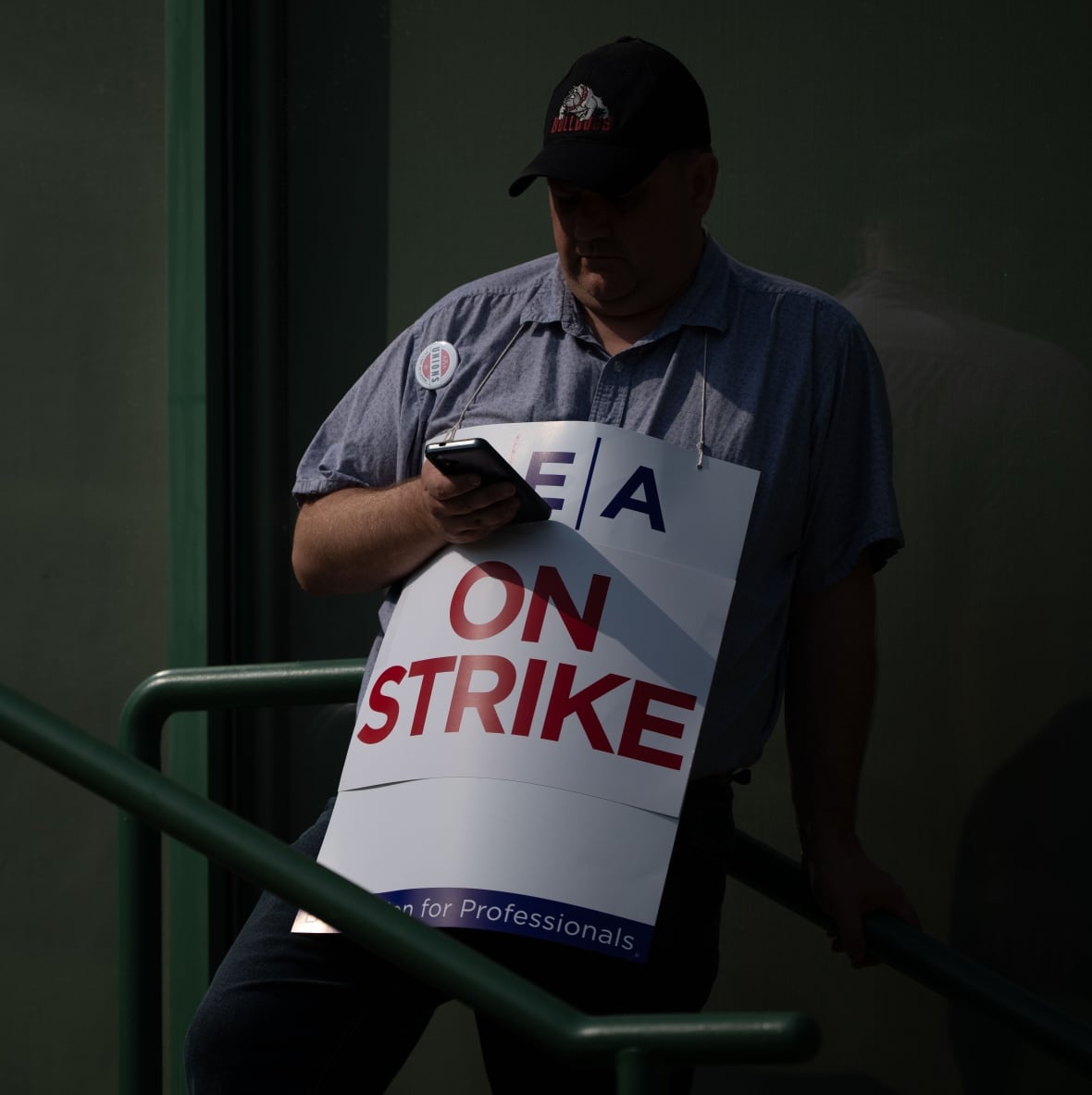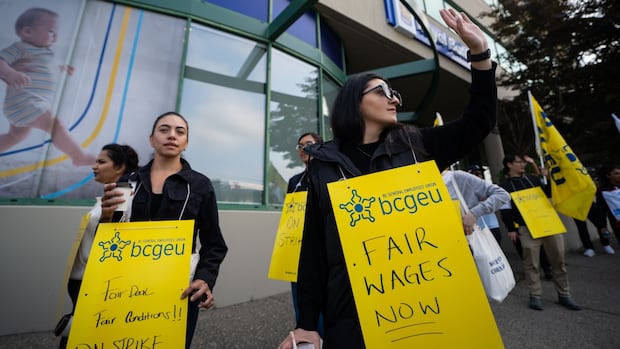One of B.C.’s largest public sector unions and the NDP government are working to get back to the bargaining table after about 2,000 unionized government workers took to picket lines Tuesday in Victoria, Surrey and Prince George.
However, B.C. Finance Minister Brenda Bailey warned that “economic circumstances have changed” following the COVID-19 pandemic and the ongoing trade war.
“We’re looking for an agreement that supports fair wages, fair working conditions but also is fair to all British Columbians,” Bailey told CBC News Tuesday afternoon.
She spoke hours after Paul Finch, the B.C. General Employees Union (BCGEU) president, warned there could be more job action ahead.
It “will escalate over the coming days or weeks,” Finch said, speaking at a picket line outside the Jack Davis Building in Victoria, the office building that houses the Ministry of Energy and Climate Solutions.
“What we need is the government to come to the table to meet the very reasonable demands that everyone here has put forward,” Finch said.
The BCGEU is pushing for a four per cent wage increase in the first year and 4.25 per cent in the second, as well as a cost-of-living adjustment.

According to the union, the NDP government has so far offered less than half that. Bailey would not confirm what the government is offering, saying the negotiations should happen at the bargaining table.
The BCGEU set up picket lines at provincial government offices in Victoria, Surrey and Prince George, as well as in front of the Royal B.C. Museum in the province’s capital.
“We have a common resolve that we are going to fight for fair wages and we’re going to continue to escalate,” Finch said.
He said the job action will continue “as long as it takes to get fair wages in the public service.”
The Early EditionMore than 34,000 B.C. public employees take job action to demand better wages
After an overwhelming vote in favour of job action, members of the B.C. General Employees Union and the Professional Employees Association have commenced job action this morning. Paul Finch, president of the BCGEU, explains what union members are negotiating for and what disruptions could take place in public services.
The BCGEU has about 34,000 members in fields including social services, health care, education, government liquor stores, prisons, courts and public administration.
Members include 2,000 B.C. Wildfire Service workers, 2,350 correctional officers and sheriffs, and 4,850 liquor and cannabis retail and distribution staff, as well as more than 14,000 administrative professionals, according to the union.

The government has said essential services are unaffected.
The previous collective agreement expired on March 31, and the government has declined to say what has since been offered to the union.
Finch had announced Friday that a 72-hour notice of a potential strike had been issued, and the deadline expired after midnight Monday night.
The province’s Public Service Agency and the BCGEU’s public sector bargaining team reached an impasse in July.

The job action comes after 92.7 per cent of voting members supported strike action in a vote released Friday.
Finch said in a statement that workers are “facing an affordability crisis,” adding that their job action is a declaration that the latest offer from the province is “unacceptable.”
“These same people who are struggling to make ends meet have voted overwhelmingly to strike,” Finch said, adding the members are “willing to fight for the deal that they need.”
The BCGEU last took job action in 2022 — a two-week strike impacting B.C. Liquor Distribution Warehouses.
At the time, the government and BCGEU reached a three-year deal that resulted in between a 12 and 14 per cent wage increase for unionized workers over three years.
The B.C. General Employees’ Union says its plan for job action is moving forward. As CBC’s Pinki Wong reports, more than 34,000 public sector workers are in a position to strike on Tuesday.
Striking BCGEU members at the Jack Davis Building Tuesday were waving union flags while the 1982 hit song Eye of the Tiger and other music played in the background.
A number of passing vehicles honked in support of the striking members, some of whom set up roadside tables stocked with coffee and doughnuts.
Workers at the picket lines declined to comment on the strike.
Finch said the honking reflected the public support for fair wages for his members who are frustrated that management wage levels have grown at almost twice the rate as that of front-line workers.
Professional Employees Association also on strike
Alongside BCGEU members, more than 1,800 Government Licensed Professionals (GLPs) represented by the Professional Employees Association (PEA) are also on strike.
That group includes engineers, foresters, geoscientists, psychologists and other specialized workers.
The association says it has been in negotiations with the province since late May. It too is looking for increased wages, but is also after professional fee coverage, “appropriate” compensation for emergency work and is asking the province to reduce reliance on external contractors.

“When the province has staff shortages, the work that needs to get done is contracted out at a higher cost and this costs taxpayers more,” Melissa Moroz, the PEA’s executive director and lead negotiator told CBC News.
“We have cases where sometimes we have consultants overseeing consultants, so what we’re saying is now is the time to invest in B.C. professionals.”
She said if the strike continues, there will be “costly delays” for the province in forestry, mining and infrastructure projects.
“The energy is high and we’ve got a lot of community support,” Moroz said.”We don’t want to escalate this strike, but we will do that if that’s what’s needed.”








